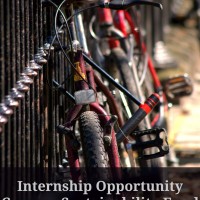Spring 2013 ENVIR 480 Sustainability Studio- 5 credits
Topic: Greening up UW’s investments
Can UW’s investments be green? Earn course credit and gain professional experience while contributing to a hot topic among universities across the country. In Spring 2013 ENVIR 480 Sustainability Studio, students will engage in applied research about the environmental and social impacts of their personal investments, as well as provide analysis and insight to a UW discussion about the topic.
Did you know…the UW has an investment portfolio of over two billion dollars? This includes endowment investments of almost $13 million in sustainable industries and almost $200 million in sustainable forest lands. The UW encourages ethical considerations in its investing decisions, and investing in Sudan or in tobacco companies is prohibited. Should environmental impacts be considered? Meanwhile, there is discussion at UW about establishing “greener” options including a sustainability revolving loan fund for faculty and students to research campus sustainability solutions.
In ENVIR 480, we will explore potential green investing strategies, and their social and economic implications, for the University of Washington. Possible questions for student research projects include:
What strategies have other institutions used to green up their portfolios?
What are the likely financial, environmental and social consequences, both pro and con, of fossil fuel divestment? (a question being pushed by Bill McKibben, see http://gofossilfree.org/)
- What are financial implications for low-income and minority students?
- What are the possible financial returns of a sustainability revolving loan fund?
- How can more innovative sustainability initiatives be funded?
Students will partner with high-level financial administrators at the University of Washington, such as the Treasury Office, as well as environmental economics experts.
ENVIR 480
SLN: 13747
Class Date/time: Tues/Thurs 12:30-2:20, Wallace Hall (ACC) 120
Taught by Megan Horst, Teaching Associate in POE and pre-PhD in Urban Design and Planning
Open to all majors/no prerequisites- Only an interest in sustainability. Capped to maintain small class size.


